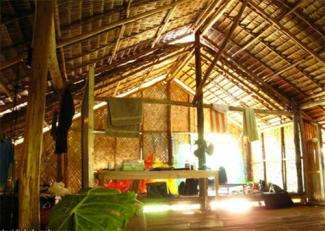Members of the Palawan Indigenous Communities in Brookes' Point and neighboring municipalities in Southern Palawan are increasingly impacted by mining corporations and by the expansion of oil palm plantations. There is a need to consolidate the positions of the Indigenous communities, identify common solutions and joint counter-strategies to have a stronger and more effective advocacy.
The Ancestral Land/Domain Watch (ALDAW), an advocacy network composed of Indigenous peoples and communities, proposed to have an advocacy outpost based in the community where meetings and trainings can be held and where para-legal services can be provided. It was designed to be culturally appropriate to reflect the people's tribal identity, thus the structure to be built was the kelang banua or traditional long houseof the Palaw'an tribe.
The specific project objectives are the following: 1) To provide communities members from different municipalities with an appropriate venue for gathering and discussing issues of common concern; 2) To provide weekly-based para-legal counseling and legal assistance to member of indigenous communities, through the voluntary support of a professional attorney, who is also a member of the ALDAW; 3) To provide community members and the ALDAW local staff with immediate internet facilities to coordinate urgent matters and field alert with the Aldaw international counterpart based in Europe and in charge of linking locally grounded efforts to global advocacy and international campaigns; 4)To provide training facilities and a community learning center for indigenous youth and volunteers; 5) To host an indigenous-based radio station to facilitate intra-communities communication; and 6) To store audio-visual materials and other references so that these will be made freely available to indigenous visitors.
ALDAW successfully completed the project and the indigenous communities now have a newly-constructed kelang banua, 8.5mx10m and fully furnished with lighting and electricity, for them to carry on with their advocacy campaigns and other. The budget was maximized to build two separate toilet rooms and the purchase of one unit jetmatic water pump. There is now potable water available in the facility, and it is able to serve all the other residents in the Sitio of Kuranga, Brgy. Impilan, Palawan.
The kelang banua hosts activities every week, among them the training of community health workers, and the exposure/immersion of students from the University of the Philippines Anthropology Field School (UPAFS). Even the Local Government Unit (LGU) expressed their appreciation and used the facility as well. Since April 15, 2012, the kolang banua has hosted 15 meetings, 10 of these by the LGUs, and five by the Indigenous organizations.
Other activities that were undertaken in the kelang banua were the following:
1. Drafting (community) affidavits against mining;
2. Orientation and briefing on the provincial mining and palm oil situation;
3. Thanksgiving ritual, as well as the processing of traditional foods like tabad and melmel; and
4. Dedicated ritual for the successful completion of the Kelang Banua construction, which also coincided with the time that NCIP released its report on the application for Certificate of Precondition of MacroAsia mining company.
The Kelang Banua attracts a lot of users because its design allows for projector display to be visible even during day time, and there is good ventilation because of the bamboo floor and palm roofing.
Before the success, the project team had difficulty in designing the traditional longhouse, and at the start of the construction, because there is no actual kelang banua that exists anymore in the province of Brooke's Point. The project team had to consult the elderly members of the Palaw'an Tribe in Brooke's Point so that they will be able to make the culturally correct design. Another challenge in implementing the project was the unbidden rise of construction materials during the project period.
ALDAW recommends establishing a Cultural Heritage Center, following the positive experience of building the kelang banua.The said Center can be an archive of the various implements, documents, and research information of the Indigenous Peoples of Palawan.
This would be feasible to pursue, as another favorable factor is that the Palawan Government is considering naming Brooke's Point as the Eco Tourism capital of the country. The Samdhana small grant has provided not only a physical structure, but a space for collective action among Indigenous communities, nurturing solidarity, and living out the Palaw'an culture.




